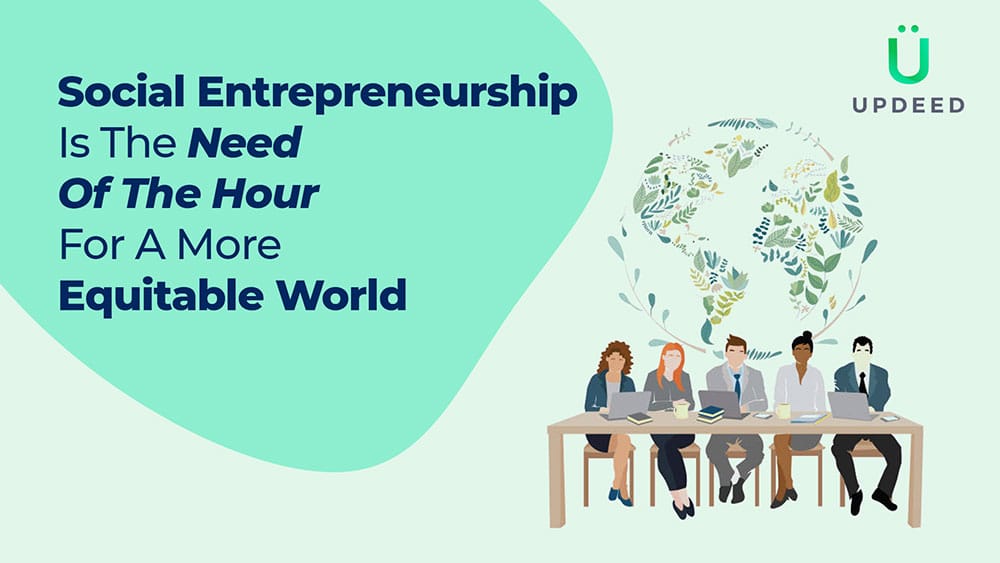Social Entrepreneurship Is The Need Of The Hour For A More Equitable World
Social entrepreneurs combine business acumen with a deep sense of social responsibility to create positive change by addressing pressing social and environmental issues.
In the face of these global challenges, such as poverty, inequality, environmental degradation, and healthcare gaps, social entrepreneurship has the potential to transform communities and improve the lives of countless individuals.
By employing entrepreneurial strategies, these changemakers create self-sustaining ventures that generate positive social outcomes while generating revenue.

Addressing Pressing Global Challenges
Social entrepreneurs like Muhammad Yunus, founder of Grameen Bank, have revolutionised the fight against poverty. Yunus introduced the concept of microfinance, providing small loans to individuals who lack access to traditional banking services. Through microcredit, he has empowered millions of people, particularly women, to start their businesses and break free from the cycle of poverty.
Sakena Yacoobi, the founder of the Afghan Institute of Learning (AIL), is a leading social entrepreneur addressing educational gaps in war-torn regions. AIL provides quality education, healthcare, and skills training to marginalised communities, especially women and girls in Afghanistan. Yacoobi’s organisation has played a crucial role in rebuilding the educational infrastructure and empowering individuals to create a better future.
Wangari Maathai, the founder of the Green Belt Movement, dedicated her life to environmental conservation and community development in Kenya. She promoted tree planting, women’s empowerment, and sustainable agriculture through her initiative. The movement has planted millions of trees, combating deforestation, promoting biodiversity, and improving livelihoods.
Dr Devi Shetty, the founder of Narayana Health, is a pioneering social entrepreneur who has revolutionised healthcare delivery in India. His organisation provides affordable, high-quality medical services, focusing on heart surgeries and other critical treatments. By leveraging economies of scale and advanced technologies, Shetty has made healthcare accessible to millions previously excluded.
Jacqueline Novogratz, the founder of Acumen, has been instrumental in advancing impact investing as a force for positive change. Acumen invests in social enterprises that tackle poverty and drive sustainable development. Novogratz’s visionary leadership has fostered a movement where capital is directed towards ventures with measurable social impact.
The Need for More Social Entrepreneurs:
Social entrepreneurs bring fresh perspectives and innovative solutions to address deeply rooted societal problems. Their disruptive approaches challenge the status quo, paving the way for transformative change.
They collaborate with various stakeholders, including governments, NGOs, corporations, and local communities, to create holistic and sustainable solutions. Their ability to foster partnerships enhances the effectiveness and scalability of their impact. They not only create social impact but also drive economic growth. Social entrepreneurs contribute to poverty reduction and society’s overall prosperity by creating job opportunities, particularly in marginalised communities.
They prioritise environmental sustainability, recognising the urgency of addressing climate change and preserving natural resources. Their ventures often embrace eco-friendly practices, renewable energy solutions, and circular economy principles, promoting sustainable development for future generations.
Social entrepreneurs serve as inspiring role models, demonstrating that individuals have the power to make a difference. Their stories and successes inspire others to take action, igniting a ripple effect of positive change and empowering more individuals to become changemakers themselves.
Systemic Change: Social entrepreneurs not only address the symptoms of societal issues but also work towards systemic change. They strive to create long-lasting impacts and tackle root causes by challenging underlying structures and advocating for policy reforms.
They possess the resilience and adaptability needed to navigate complex challenges. They thrive in adversity, leveraging their entrepreneurial mindset to find innovative solutions and pivot when necessary.
Social entrepreneurs understand the unique needs and context of their communities. They tailor their solutions to local cultures, customs, and challenges, ensuring their impact is relevant, sustainable, and inclusive.
Conclusion
Social entrepreneurs have emerged as catalysts for positive change in a world of multifaceted challenges. Their innovative ideas, entrepreneurial spirit, and unwavering commitment to social impact are shaping a better future for communities across the globe. From poverty alleviation and education to environmental conservation and healthcare innovation, these exceptional individuals have demonstrated that business and social goods can go hand in hand.
To address the pressing issues of our time, we must encourage and support the growth of social entrepreneurship. Governments, corporations, educational institutions, and society must recognise the value of social entrepreneurs and create an enabling ecosystem that fosters their success. By doing so, we can harness the power of social entrepreneurship to build a more equitable, sustainable, and inclusive world for present and future generations.
Ready to make a positive impact in the world?
UPDEED is the place for you. Our free and open platform is filled with inspiring stories from individuals and organizations who are making a difference in their communities and beyond. Connect and collaborate with like-minded individuals from around the globe on UPDEED, and discover your own potential to create meaningful change. Join our community and make a difference.





